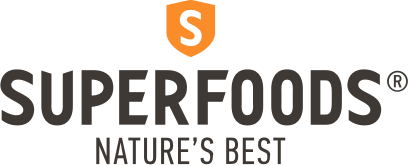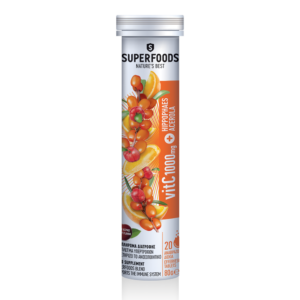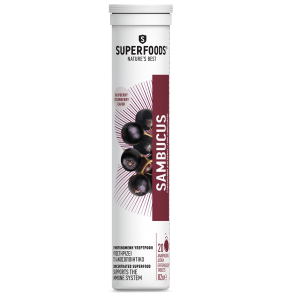Nutrition plays an extremely important role in the avoidance and the treatment of viruses, colds and simple symptoms such as a runny nose. We can shield our organism by following a specific diet that will provide our immune system with the defense it needs. This diet is governed by seven rules:
1. Sufficient and qualitative Hydration
Approximately two-thirds of the human body consists of water, which is a major contributor to nutrient transport and toxic waste disposal. Water also plays an extremely important role in regulating body temperature. At the same time, daily consumption of the recommended amount of fluids (an average of 2.5 liters) contributes to the reduction of symptoms such as formation of mucus secretions in the upper respiratory tract.
Ideal sources of hydration during the cold are pure water, non-caffeinated herbal infusions (mint, dill, sage), mountain tea and green tea combined with honey. Avoid any beverages – juices with added sugar – as sugar worsens the inflammation.

Soup is an excellent source of hydration that meets the needs of the body, offering a plethora of nutrients. An ideal recipe is considered to include fresh seasonal vegetables combined with a good source of protein. Apart from the traditional chicken soup, which has now proved to help deal with a cold, there are many alternative recipes rich in antioxidants and protein. For example: pumpkin and leek velvet soup combined with some buckwheat or quinoa (for protein intake) and freshly squeezed lime, parsley and finely chopped red chilly pepper (for Vitamin C). During a cold, we avoid any form of alcohol that causes dehydration.
Seasonal fruits and vegetables, which should be consumed fresh and raw are also sources of hydration.
2. Consumption of Seasonal Fruits & Vegetables
We choose seasonal fruits and vegetables because they offer us the maximum nutritional value and taste as the use of pesticides and chemicals is reduced. Nature also produces specific fruits and vegetables that meet the needs of the body. For example, in autumn and winter, fruits are rich in vitamin C (citrus) to strengthen our immune system, while in the summer fruits are rich in water due to the risk of dehydration from the higher temperatures (watermelon, melon). Recommended intake is 5 portions of fruit and vegetables each day.
3. Vitamin C intake (ascorbic acid)
It is one of the most powerful antioxidants and acts against the free radicals formed in the water cellular membranes. It is believed that it strengthens and promotes the physical action / defense of the immune system. During the cold, Vitamin C is likely to reduce the duration and intensity of upper respiratory problems. Vitamin C belongs to the category of water soluble (B, C), so it is very important to consume all fruits and vegetables that are rich in Vitamin C and are not cooked or processed in any way. It is perhaps the most sensitive vitamin in both water and extremely high / low temperatures. After 24 hours in the refrigerator, Vitamin C loses ¼ of its value, and after 48 hours, the loss doubles.
Rich sources of vitamin C are guava, grapefruit as well as all citrus fruits (lime, lemon, orange, and mandarin), plum Kakadu, kiwi, the family of berries, red pepper, fresh chili peppers, cabbage and Brussels sprouts.
4. Sufficient intake of healthy protein
15-20% of total daily energy needs must be covered by “good” protein sources. This is even more important when the body needs more energy to create antibodies and fight infections. The protein is primarily associated with red or white meat and dairy products. During a cold (and not only), saturated fat should be reduced to a minimum, thus, full dairy products and red meat must be avoided. As regards animal protein, white lean meat (turkey) and kefir are recommended. Alternative sources rich in protein of plant origin are nuts and seeds, legumes, and some cereals such as quinoa, buckwheat and oats, soy beans and mushrooms.
5. Consumption of Curcuma
Curcuma is a spice with a characteristic yellow color, which is also known for its anti-inflammatory properties. In India, it is considered to be a vegetable cortisone. Its main ingredients are curcumin and polyphenol. It must be consumed daily, especially in cases of cold, in order to prevent the worsening of the first symptoms. One way of eating is: 1kg in 100ml of warm water with 1kg of honey.
6. Preservation of Normal Body Weight
Keeping a normal body weight protects from colds and diseases such as heart diseases and metabolic syndromes. Underweight and overweight people have a weakened immune system, making them more susceptible to infections. Normal body weight also helps during physical exercise that shields the body against viral agents.
7. Rationalised and targeted use of nutritional supplements
Upon appearance of the first symptoms we should strengthen our body. All the above, along with targeted nutritional supplements prescribed by a physician or a pharmacist will help us do so.
The herbal formulations that concentrate all the quality and action of a unique natural substance in a capsule are ideal. Especially during the period of the cold, our body should not consume extra energy to absorb anything foreign, as it is already weakened. This category includes SUPERFOODS Supplements. More specifically, the new ECHINACEA x3 supplement combines three unique different species from the famous Echinacea plant, Vitamin C and Zinc. The uniqueness lies in the fact that while each species has a distinct and targeted action, all three work together to prevent and reduce the intensity and duration of the symptoms of a simple cold. It is the ultimate ally of the winter, as the three Echinacea species combined with Zinc and Vitamin C work together in the most effective way, contributing to the optimal defense of the immune system.




